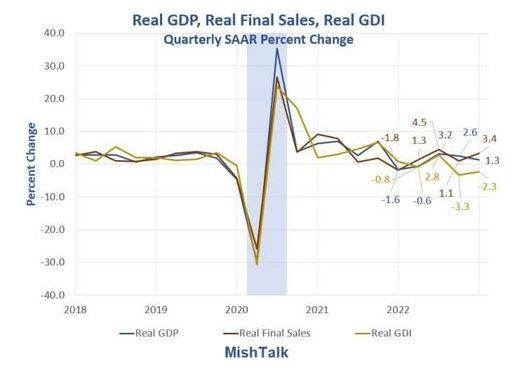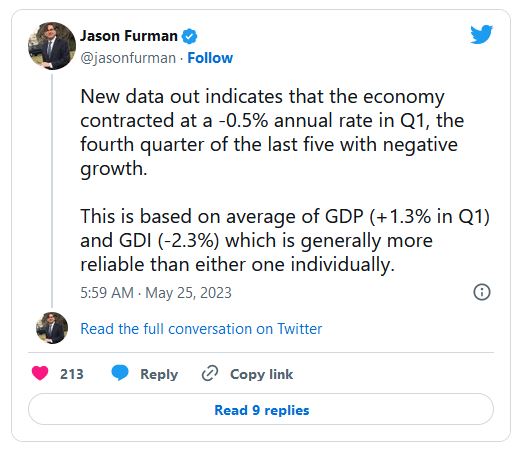Gross Domestic Income GDI Suggests the US Is In Recession Right Now
Authored by Mike Shedlock via MishTalk.com
Gross Domestic Income (GDI) and Gross Domestic Product (GDP) are two measures of the same thing. But they radically differ in outlook…

GDP and GDI data from the BEA, chart by Mish
Last week the BEA released the second estimated first-quarter 2023 GDP. The GDP rose from +1.1 percent to +1.3 percent. And personal consumption expenditures (PCE) rose from +3.7 percent to +3.8 percent.
The BEA does not release GDI in the advance estimate but does in the second estimate.
GDI was -2.3 percent in the first quarter of 2023 and -3.3 percent in the fourth quarter of 2022.
That’s recession territory, but GDP isn’t!
GDP and GDI Details
- Real gross domestic product (GDP) increased at an annual rate of 1.3 percent in the first quarter of 2023, according to the “second” estimate released by the BEA. In the fourth quarter, real GDP increased by 2.6 percent.
- The updated estimates primarily reflected an upward revision to private inventory investment.
- The increase in real GDP reflected increases in consumer spending, exports, federal government spending, state, and local government spending, and nonresidential fixed investment, partly offset by decreases in private inventory investment and residential fixed investment. Imports, which are a subtraction in the calculation of GDP, increased.
- Real gross domestic income (GDI) decreased by 2.3 percent in the first quarter, compared with a decrease of 3.3 percent (revised) in the fourth quarter.
Corporate Profits
- Profits from current production (corporate profits with inventory valuation and capital consumption adjustments) decreased by $151.1 billion in the first quarter.
- Profits decreased by $60.5 billion in the fourth quarter.
- Profits of domestic financial corporations decreased by $25.4 billion in the first quarter, compared with a decrease of $59.0 billion in the fourth quarter.
- Profits of domestic nonfinancial corporations decreased by $109.3 billion, compared with a decrease of $22.9 billion.
- Rest-of-the-world profits (net) decreased by $16.4 billion, in contrast to an increase of $21.4 billion.
Average of GDP and GDI Also Signals Recession
The average of real GDP and real GDI, a supplemental measure of U.S. economic activity that equally weights GDP and GDI, decreased by 0.5 percent in the first quarter, compared with a decrease of 0.4 percent (revised) in the fourth quarter.
The BEA discusses the average GDP and GDI because that is what the National Bureau of Economic Research (NBER) uses as an input to determine recessions.
Even if one averages the numbers, a recession is possible, if not likely.
But the NBER is so delayed in its determination.
When the NBER releases a recession announcement, it will be clear which one of these numbers is wrong.
Mish is not alone in pointing this huge discrepancy out, as former Chair of the Council of Economic Advisors, Jason Furman recently explained in a brief Twitter thread.

He continued:
I can’t know where the negative growth comes from because the expenditure numbers (consumption, investment, etc.) sum to the 1.3% growth. So, if that’s wrong, then one of the components is wrong.
That is why I wish the BEA were more Bayesian in formulating a single number with with the best info.
Reported consumption growth was robust at 3.8%. Non-residential fixed investment is up 1.4%. Inventories subtracted 2.1pp from the growth rate (as measured on the product side), a factor that is likely to be temporary.
On the income side, corporate profits fell for the third quarter and are down 2.8% over the last year.
But this reflects a massive loss for the Fed. Taking that out, profits were down slightly in Q1 and up 7.0% in the last quarter.
I find all this confusing and want to think more about it and read what others say. The numbers are telling wildly varying stories about the truth in the economy. And then that truth has some strange aspects (like the Fed losses).
If I genuinely believed the average of GDP + GDI (and I mostly do believe it), then one could reasonably describe the economy as having been in recession for some time, but a great recession with solid employment gains and low unemployment–so a productivity decline.
Revisions:
A recent GDP revision was in the direction of GDI.
Given that heading into recessions, most revisions tend to be harmful and positive recessions; there is no solid reason to pooh-pooh GDI.